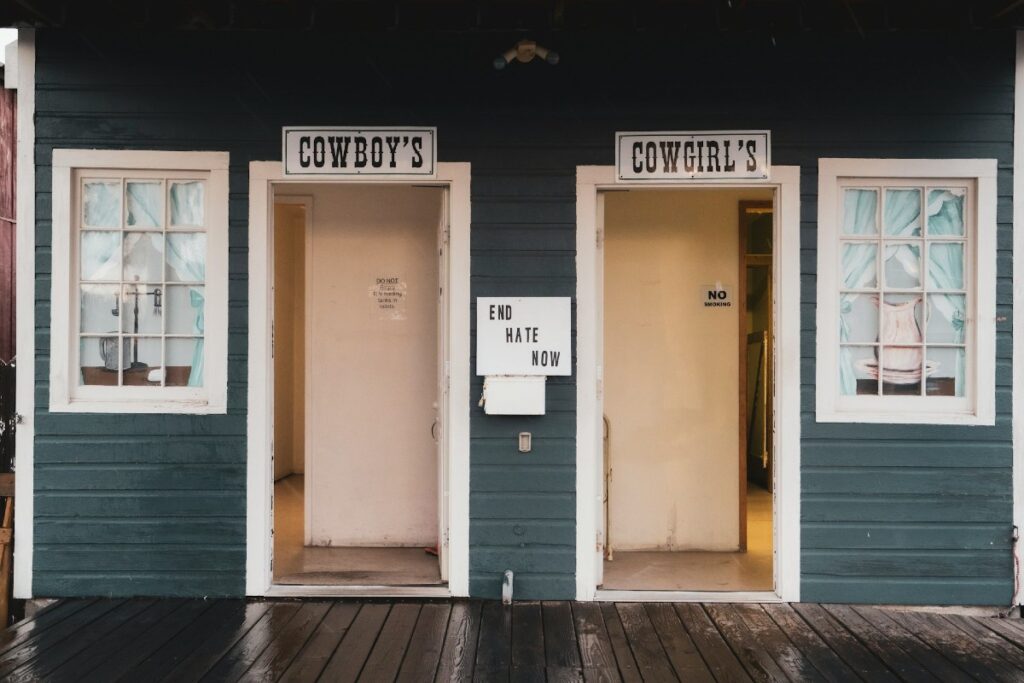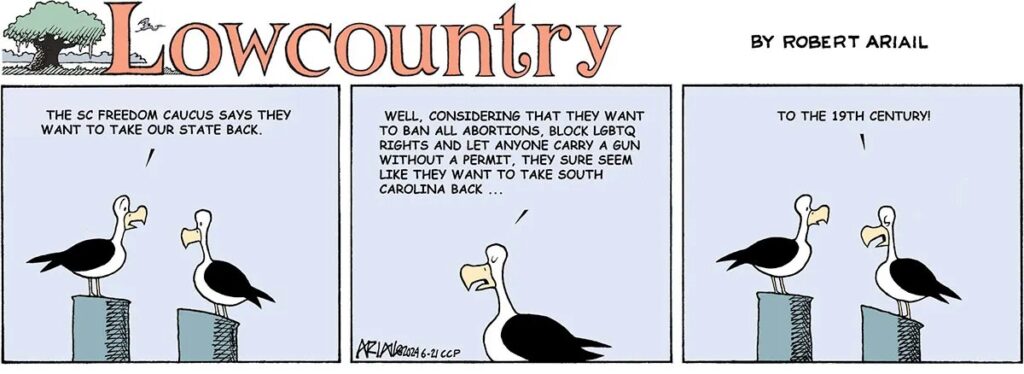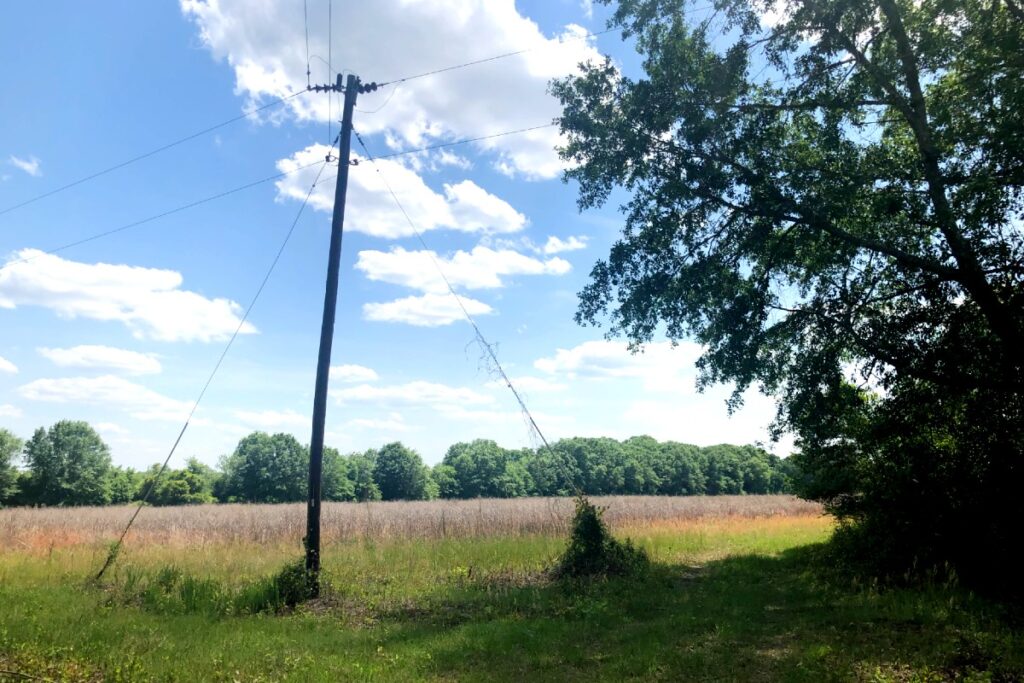STATEHOUSE REPORT | ISSUE 23.25 | June 21, 2024
BIG STORY: Budget provisos no way to make policy, critics say
MORE NEWS: State budget on track for passage next week, sources say
LOWCOUNTRY, Ariail: Taking us backwards?
COMMENTARY, Brack: Growing up in today’s South may be harder than in past
SPOTLIGHT: The Felkel Group
MY TURN, Rex: A free and fair election?
MYSTERY PHOTO: Old-timey mural
FEEDBACK: Send us your thoughts
Budget provisos no way to make policy, critics say

By Jack O’Toole, Capitol Bureau | Government watchdogs are crying foul as South Carolina legislators prepare to pass sweeping new laws through budget directives that circumvent normal legislative debate and deliberation.
The directives, or provisos, are budget instructions that place specific conditions on how state dollars can be spent. For instance, the best known – and often most controversial – form of proviso is the earmark, which typically directs a state agency to spend a certain amount of money on, say, a local festival or infrastructure project.
But increasingly, watchdogs say, legislators are using provisos to push through controversial social policies, such as statewide restrictions on public school lesson plans, without proper public scrutiny or committee review.
“Social policy issues should be addressed through the full legislative process, including public hearings,” said Lynn Teague, Vice President of the League of Women Voters, in an interview with Statehouse Report. “It’s an evasion of public responsibility to tuck these things in as budget provisos.”
This year, four provisos affecting South Carolina parents, teachers and children are raising red flags among policy experts and activists. They say the directives are either poorly conceived, poorly drafted or both – and are problems that could and should have been addressed in the normal legislative process.
A bathroom bill – or rather, proviso – for schools
Unable to pass a so-called “bathroom bill” as stand-alone legislation during the regular session, supporters have inserted a proviso in the budget ordering public schools to require K-12 students to use the bathroom or locker room that corresponds with their birth sex rather than their gender identity.
Supporters say the measure is necessary to protect girls’ intimate spaces from mischievous boys or worse, but opponents warn of unintended consequences that they say would have become clear if the proposal had faced normal public scrutiny.
“I personally know of at least six kids who aren’t ‘out’ as trans to any of their classmates,” said Chase Glenn, executive director of the Alliance for Full Acceptance. “This proviso would suddenly ‘out’ them to everyone and put a target on their backs for bullying.”
Moreover, Glenn argues, policy-makers should rely more on the experience and expertise of local professionals and less on one-size-fits-all statewide solutions.
“Administrators and teachers have relationships with these students and their parents, and they already have processes in place to support them in ways that protect all students,” he said. “So now we’re going to start telling them how to do their jobs?”
New local library restrictions
 nother social-issue proviso of concern to some would require local libraries to remove any materials from youth sections that might “appeal to the prurient interests of children under seventeen.” Under the proviso, the S.C. State Library would be responsible for enforcement.
nother social-issue proviso of concern to some would require local libraries to remove any materials from youth sections that might “appeal to the prurient interests of children under seventeen.” Under the proviso, the S.C. State Library would be responsible for enforcement.
And again, subject-area experts believe the policy idea would have benefitted from the kind of formal committee review that forces bill sponsors to address real-world challenges and defend the proposal before legislative language is finalized.
“We’re concerned about the proviso from both a legal perspective and an administrative perspective,” State Library Director Leesa Aiken told Statehouse Report. “I don’t think we have the legal authority to oversee local collection development and we don’t have the resources, either.
In addition, she noted, the “prurient interests” standard would be difficult, if not impossible, to enforce outside of the context of local community standards.
“Prurient is extremely subjective, so who is going to define that?” Aiken asked. “Librarians (rely on) parental and community involvement, and this proviso butts up against that principle of home rule.”
Cell phones banned during school hours

Administrators and teachers say they are broadly supportive of a proviso banning cell phone use by students during school hours, but they worry that important implementation and enforcement details have been overlooked.
“Cell phones are a huge distraction and this is something teachers have been complaining about for years,” said Sherry East, president of the South Carolina Education Association. “But a lot of districts already have a cell phone policy. It’s the enforcement that’s the problem.”
Under the terms of the proviso, the state Department of Education would be responsible for compliance. But East worries the largely opaque proviso process has frozen out local parents, perhaps making the job of enforcement impossible.
“We’ve already heard from some parents that don’t agree with this,” East said. “And if enough parents complain, will the Department of Education even want to try to enforce the policy?”
Prohibiting difficult books and lessons on race
A fourth proviso raising concerns is a ban on teaching certain concepts that critics tend to lump together under the umbrella of “critical race theory.”

The proviso isn’t new in this year’s budget – it was first passed in 2021 – but educators and activists say recent events demonstrate why it should not be passed again without a genuinely deliberative legislative process.
Specifically, they point to the case of a Richland County teacher who was forced to stop teaching Ta-Nehisi Coates’ National Book Award-winning memoir Between the World and Me in an AP Literature class, and to the elimination of AP African American Studies in state public schools.
“When it comes to this proviso, we’ve already seen its effects,” ACLU of South Carolina spokesman Paul Bowers told Statehouse Report. “Writing something like this (proviso) into the budget is a gift to pro-censorship and anti-public education groups.”
But just as much, Bowers said he worries about the lack of basic accountability when legislators use the proviso process to make complex social policy.
“Legislating by proviso is cowardly behavior. And by sneaking their policy preferences into the budget, they get to skip the public hearings and debate where South Carolians would be able to speak their minds,” he said.
- Have a comment? Send to: feedback@statehousereport.com.
State budget on track to pass next week, sources say

By Jack O’Toole, updated 4 p.m., June 21, 2024 | After a week’s delay and significant backroom maneuvering, the $14 billion state budget is back on track and headed toward final passage next week.
Members of the joint House and Senate conference committee tasked with brokering a deal to reconcile the budget bills passed by each chamber met at 2:30 p.m. Friday. Moments later, a budget spreadsheet with details of the final compromise was introduced and passed unanimously.
“We’ve had a very successful time dealing with the budget,” Senate Finance Committee Chairman Harvey Peeler, R-Cherokee, told conferees. “I’m proud of it.”
Highlights of the compromise budget include:
- A state income tax rate cut from 6.4% to 6.2%, providing a billion dollars in annual tax relief.
- Starting teacher pay increased to $47,000 from $42,500.
- A $1,125 annual pay raise for state employees making less than $50,000 and a 2.5% raise for those making $50,000 or more. In addition, employee health insurance plan price increases were fully covered by the state.
- Full funding for the planned Clemson University veterinary school ($175 million) and the new University of South Carolina medical school campus ($100 million).
- $200 million toward bridge repairs, plus an additional $200 million for county transportation committees.
- $117 million for rural road improvements.
- $47 million for rural infrastructure.
Barring any last minute snags, both chambers are expected to pass the final 2024-25 budget in a special session on June 26.
In other recent news:
![]() DHEC hands off restaurant inspections to new agency. The state Department of Health and Environmental Control formally will transfer its food safety staff to the S.C. Department of Agriculture’s Consumer Protection Division in less than two weeks. Inspectors will continue to oversee inspections of 22,000 retail food establishments across South Carolina.
DHEC hands off restaurant inspections to new agency. The state Department of Health and Environmental Control formally will transfer its food safety staff to the S.C. Department of Agriculture’s Consumer Protection Division in less than two weeks. Inspectors will continue to oversee inspections of 22,000 retail food establishments across South Carolina.
Advocates push S.C. lawmakers to do more for suicide prevention. Data from the Centers for Disease Control and Prevention shows the number of suicides in South Carolina are increasing, pushing advocates to launch efforts. to slow the number down.
Book on race removed from S.C. classrooms by budget proviso, but teacher taught it again. One year after a lesson on a Black author’s memoir was shut down in a Midlands classroom, drawing national attention to the situation, the teacher brought it back.
Budget proviso could make it hard to enforce beach protection laws. “Legislation that could require South Carolina to pay wealthy seaside property owners who win legal battles involving oceanfront development has been approved as part of the state budget.”
Upstate activists pushing for hate crimes law. South Carolina, one of only two states without a hate crimes law, is getting a renewed push to get one after racist threats in the Upstate.
Taking us backwards?

Nationally award-winning cartoonist Robert Ariail always has an interesting take. This week, he takes a swipe at the uber-right S.C. Freedom Caucus. What do you think – love the cartoon? Hate it? Send your thoughts to feedback@statehousereport.com.
Growing up now in South may be harder than in past

By Andy Brack | Ninety years ago, the red, sandy field in middle Georgia buzzed with agricultural activity as a grandfather worked the land to coax cotton out of 12 acres. It was hard work for a man who left school after seventh grade. After ginning a crop and paying back a government loan for seed and fertilizer, he pocketed about $50. For the year.
For all of the talk these days in politics about going back to simpler times, people forget the sweat and toil across a South with no air-conditioning, few phones, little reliable electricity and the soul-numbing racism, misogyny and poverty that filled every rural crack and crevice throughout the region. It was a different time.
Fast forward to the post-World War II years when my father grew up – not on the farm, but in the big city of Macon, Ga., where the family eventually shifted from renters to owners of a small home. Communication and transportation got better. Prosperity bloomed as more people moved off the farm and sent their kids to decent public schools. Some even became the first in their families to get college degrees.
The family unit was still strong as in-town folk often returned to the country to visit, eat, attend church services and generally commune. And while times were changing, the old bugaboo of race lurked in segregated schools, cafeterias, bus stations, theaters and daily interactions. “The good old days” still weren’t all that good for too many people across the South.
Then came my generation where the late 1960s and 1970s saw huge changes with conflict among the old and young over civil rights, war, pollution and lifestyles. What emerged was an inward-focused culture that was more equal and diverse, but too comfortable with ego and greed. Too much of family got shoved aside for the all-important “me generation.”
Again, communication and transportation got better. Technology surged with endless solutions to generational problems. But politics started getting more divisive, just as more people prospered. And in the South, lots of people started moving in, which changed things even more.
Now look at today’s youths, with their high-speed internet and social media obsessions that shrink society to a mobile phone and often put families on the sidelines. Oh, they can move money instantly, Facetime with a friend in Romania or learn a language using an app. But too many seem lonelier than the poor Southerners in times of my grandparents and parents. Today’s Southerners are connecting but getting more disconnected.
Florida-born humorist Sean Dietrich taps into this dichotomy as he plays banjo, piano and accordion to 200 audiences a year. Just this month in Charleston to a crowd of more than 400, he sang everything from church spirituals to the theme from Beverly Hillbillies. The mostly older, white audience knew the words and sang along.
Dietrich, 41, tells stories of the disappearing South, the region of the country where I worry my children and generations beyond won’t appreciate the Sunday church dinners on the grounds with tables laden with the best fried chicken, weird jello “salads’ and desserts galore.
“These stories are mostly about growing up in this interesting and diverse hotbed we call the South and there are so many shared experiences that we have from growing up in this part of the world,” he said in a recent interview. “And I fear that that way of life that we experienced when we came in — at least my generation — came in on the tail end of that way of life, and it’s falling apart.
“Everybody’s learning how to talk like Midwestern sports announcers. Everybody is learning how to be this global community instead of this rich, strong region that we used to experience.”
It all worries me too – the disconnect with extended family, the technological onslaught that sends us deeper into personal holes, the polarized politics grasping at a past that’s not going to come back.
And while society now is more diverse and has more knowledge, I don’t think I’d want to grow up in the challenging world that kids encounter today. What about you?
Andy Brack is editor and publisher of Statehouse Report and the Charleston City Paper. Have a comment? Send to: feedback@statehousereport.com.
The Felkel Group
 The public spiritedness of our underwriters allows us to bring Statehouse Report to you at no cost. This week in the underwriter spotlight is The Felkel Group, a battle-tested public affairs and business development firm that assists corporations, associations and not-for-profits that are serious about their long-term success. The Felkel Group solves problems, crafts and delivers messages, helps organizations to manage crisis, and uses a wealth and breadth of valuable relationships to help to seal deals.
The public spiritedness of our underwriters allows us to bring Statehouse Report to you at no cost. This week in the underwriter spotlight is The Felkel Group, a battle-tested public affairs and business development firm that assists corporations, associations and not-for-profits that are serious about their long-term success. The Felkel Group solves problems, crafts and delivers messages, helps organizations to manage crisis, and uses a wealth and breadth of valuable relationships to help to seal deals.
The Felkel Group is also home to an outstanding advocacy tool called The Rap Index, a powerful intelligence tool that employs sophisticated computer modeling and profiling techniques to help organizations find their most effective advocates. To learn more about The Felkel Group and its Rap Index, go to: http://www.felkelgroup.com.
Rex: A free and fair election?

By Jim Rex | Most Americans appreciate and value a contest that allows qualified contestants to compete on a level playing field utilizing and adhering to the same rules. Whether it is athletics, business or politics, most of us believe that “fair” competition is likely to give us the best legitimate outcomes.

Unfortunately, the CNN presidential debate scheduled for June 27 – which is three months prior to usual first presidential debate among parties – and the arbitrary and unevenly applied criteria used to qualify candidates for the debate seem to point to an overt attempt to ensure that the American people are allowed to hear only from two candidates, while excluding a third candidate whose poll numbers and state ballot access numbers meet the debate inclusion criteria. In fact, Robert Kennedy Jr. more clearly meets the publicized debate criteria than either former President Donald Trump or President Joe Biden – since neither of the two candidates have been nominated by their respective parties.
CNN’s published criteria says that a candidate’s name must first appear on a sufficient number of state ballots to reach the 270 electoral vote threshold. CNN is holding Kennedy to this requirement- which he is exceeding – while not requiring it of Biden or Trump. Instead, the media giant’s concocted term, “presumptive nominee,” is being used as a way of exempting both men from the requirement. The Presidential Debate Commission (which, after overseeing debates for decades, has been cooperatively circumvented by the Biden and Trump campaigns) and the Federal Elections Commission (FEC) have both publicly stated “presumptive nominee” is not a part of the debate regulations.
It is clear that the early debate date, the quickly arrived-at exclusionary debate criteria and definitions, and the closely orchestrated rhetoric from CNN and the two candidate’s campaign staffs are an attempt to stall the rising popularity of RFK Jr.. His candidacy is understandably viewed as a threat by the two “presumptive nominees” who seven out of 10 Americans dislike as their two choices in November.
As voters, we should be angered by this attempt to keep us from hearing the voice and the perspectives of the highest polling third party/independent presidential candidate in decades. What are the “presumptive nominees” afraid of? Perhaps, the fact that more and more of us are tired of the two-party domination of the messaging around our choices for improving the nation we love? Perhaps, that we are also tiring of the arrogant manipulation and narrowing of options for real solutions and a more unified America?
Please consider speaking out to CNN, the media in general and to anyone who cares enough about this election to listen about the need for us to have a truly free and fair 2024 election.
A “free and fair election” is not just about how the votes are counted in November. It is also about how fair and open the process is for voters as we strive to gain information and weigh options prior to the casting of our votes -“our” votes, not CNN’s votes or votes “owned” by any political party.
Jim Rex, a former state superintendent of education in South Carolina, is chair emeritus of the Alliance Party of South Carolina, which has nominated Robert Kennedy Jr. as its presidential candidate to appear on the 2024 ballot in South Carolina.
Old-timey mural

Here’s an interesting mural sent in by a reader, but what does it show? What and where is it? Why might it have relevance this week? Send your name, hometown and guess to: feedback@statehousereport.com.
Last week’s mystery, “Buzz buzz,” showed a sculpture somewhere in South Carolina. It’s a metal mosquito at the entrance of Mosquito Beach along Sol Legare Road on James Island.
When asked of the relevance of the sign, Allan Peel of San Antonio, Texas, hit the nail on the head: “On the surface, one might consider this to be relevant today since mosquito season is officially underway in the Charleston area, and usually lasts from between April to October. But the ‘real’ reason for asking the question of … stems from the fact that the surfboard sign [in the background] in the mystery photo was recently reported as stolen, having last been seen on April 4, 2024.” It was quickly recovered and is now back in place. More: See this story.
Hats off to the other sleuths who solved the mystery: Elizabeth Jones and Jay Altman, both of Columbia; David Lupo of Mount Pleasant; Frank Bouknight of Summerville; and Cheryl Graham of Dorchester County. Pat Keadle of Perry gets bonus points, too, for noting the sculpture was in a North Charleston competition.
- Send us a mystery picture. If you have a photo that you believe will stump readers, send it along (but make sure to tell us what it is because it may stump us too!) Send to: feedback@statehousereport.com and mark it as a photo submission. Thanks.
Send us your thoughts
We encourage you to send in your thoughts about policy and politics impacting South Carolina. We’ve gotten some letters in the last few weeks – some positive, others nasty. We print non-defamatory comments, but unless you provide your contact information – name and hometown, plus a phone number used only by us for verification – we can’t publish your thoughts.
- Have a comment? Send your letters or comments to: feedback@statehousereport.com. Make sure to provide your contact details (name, hometown and phone number for verification. Letters are limited to 150 words.
- ORDER NOW: Copies are in Lowcountry-area bookstores now, but if you can’t swing by, you can order a copy online today.
- Now available as an e-book!
ABOUT STATEHOUSE REPORT
Statehouse Report, founded in 2001 as a weekly legislative forecast that informs readers about what is going to happen in South Carolina politics and policy, is provided to you at no charge every Friday.
- Editor and publisher: Andy Brack, 843.670.3996
- Statehouse bureau chief: Jack O’Toole
Donate today
We’re proud to offer Statehouse Report for free. For more than a dozen years, we’ve been the go-to place for insightful independent policy and political news and views in the Palmetto State. And we love it as much as you do.
But now, we can use your help. If you’ve been thinking of contributing to Statehouse Report over the years, now would be a great time to contribute as we deal with the crisis. In advance, thank you.
More
- Mailing address: Send inquiries by mail to: P.O. Box 21942, Charleston, SC 29413
- Subscriptions are free: Click to subscribe.
- We hope you’ll keep receiving the great news and information from Statehouse Report, but if you need to unsubscribe, go to the bottom of the weekly email issue and follow the instructions.
- Read our sister publication: Charleston City Paper (every Friday in print; Every day online)
- © 2024, Statehouse Report, a publication of City Paper Publishing, LLC. All rights reserved.


